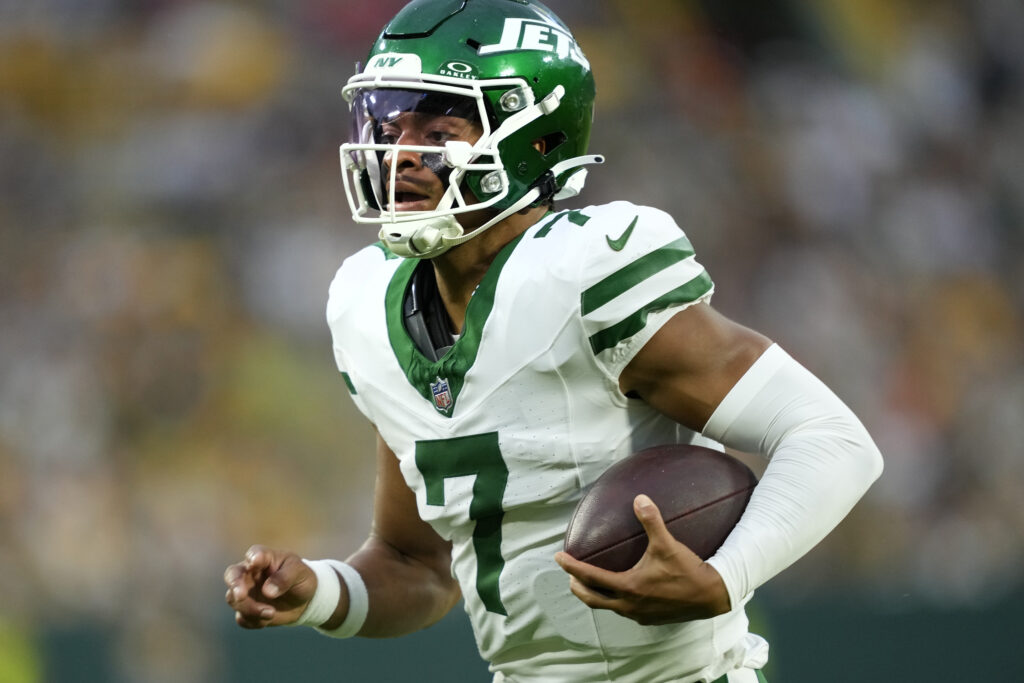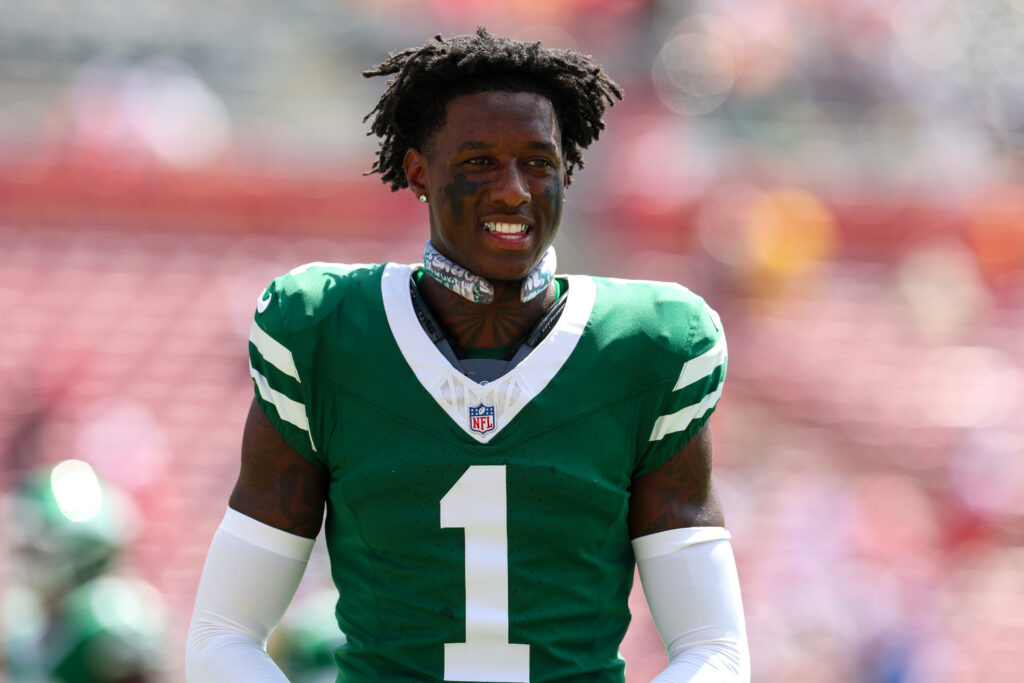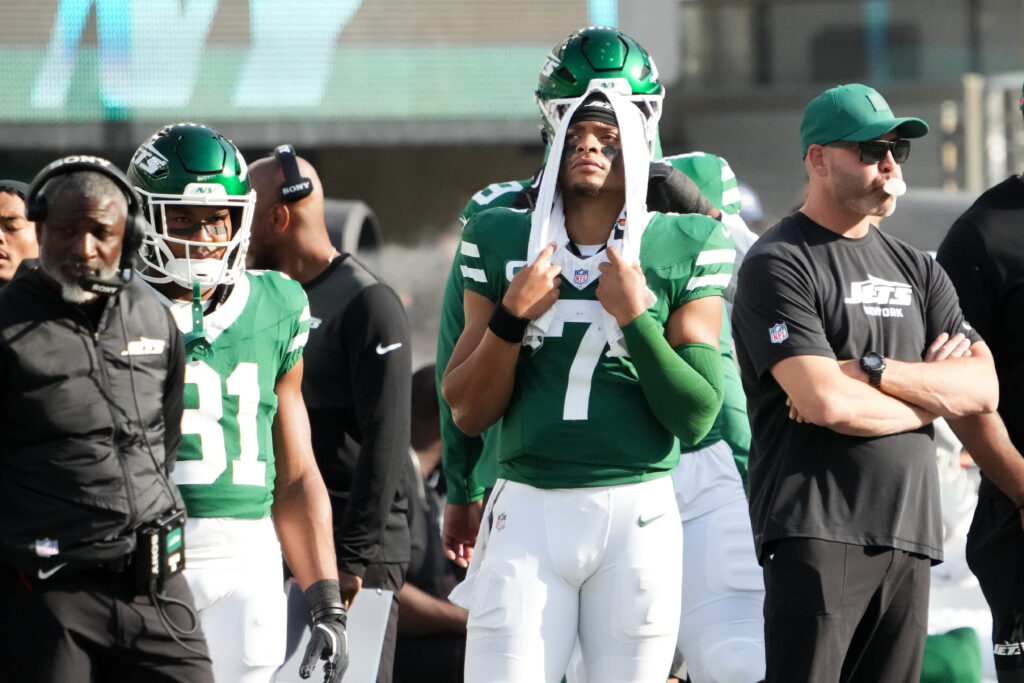The New York Jets made a bold move in March 2025 by signing Justin Fields to a two-year, $40 million deal with $30 million guaranteed. It was a clear signal of intent from new general manager Darren Mougey and head coach Aaron Glenn, who named Fields their starting quarterback almost immediately. With the Aaron Rodgers era officially over, the Jets changed their tune right away into a different offensive identity — one that will lean on Fields’ mobility and athleticism more than a traditional pocket-passing attack.
The Jets’ revamped offense, under new offensive coordinator Tanner Engstrand, is built around a run-heavy, ball-control philosophy. This approach minimizes risk, emphasizes short and efficient passes, and leverages Fields’ elite rushing ability to keep the defenses off balance. This idea goes with the mantra of toughness and controlling the clock. Running the ball more than passing and allowing the defense to do its job, making more opportunities for the offense.
This type of offense is similar to what got them into the playoffs last time with that ground-and-pound style, even though they might not have had the same rushing threat at quarterback with Mark Sanchez being at the helm during that time. Efficiency and having a positive turnover differential are what Coach Glenn preaches, and Fields gives them that opportunity to succeed at both.
Is Justin Fields the Answer to the Jets Quarterback Problems?
Through two preseason games, Fields has primarily focused on short, safe throws, averaging 5.1 yards per attempt, which is a figure that ranks 75th out of 100 qualified quarterbacks. His average depth of target (ADOT) sits at 4.4 yards, placing him 95th, a clear sign the Jets are emphasizing quick reads and risk-averse decision-making. This is fine, but you also should be trying to branch out the playbook more during this time since it is only the preseason. Allowing Fields to throw it more would’ve been the smart thing to do so he got more live game reps. A little alarming that Fields is still so inclined to just check it down.
Early in his career with the Chicago Bears, Fields often forced throws downfield. As a rookie in 2021, he posted the NFL’s second-highest ADOT at 10.1 yards, which contributed to the league’s highest interception rate that year (3.7 percent). However, he showed meaningful progress last season in Pittsburgh in limited game action, and the Jets are hoping to build on that evolution.
At 26, Fields is most dangerous when he’s able to break the pocket and extend plays with his legs. This stresses defenses and allows him to get into more RPO-based play-calling so he has the choice of running or throwing. This seems very college-gimmicky, but the NFL has adapted to this style over the years to further help quarterbacks develop faster. This play-calling won’t threaten the defense vertically but will help keep Fields comfortable in his own domain.
Offensive coordinator Tanner Engstrand has made it clear: the Jets aren’t trying to mold Fields into a traditional pocket passer. They know he’s not going to become a prototypical gunslinger overnight, and they’re not asking him to. This quote from Engstrand the other day validates how he doesn’t expect Fields to try to be someone he’s not:
“If (the defense is) going to allow him to take a shot down the field, then he’s gonna take it. If they don’t allow him, then he’s gonna check the ball down and we’re gonna move on to the next play, and we’re all good with that.”
The coaching staff is embracing his strengths: mobility, improvisation, and decision-making within a controlled structure. This is smart for any play-caller to set up their quarterback for success, but you do also want to see him take steps in the right direction for his development. This cautious approach could keep the Jets in games but might hurt them when they fall behind and have to play catch-up against others.
Still, there are valid concerns. Fields’ struggles as a passer have followed him from Chicago to Pittsburgh to now New York. There’s a reason Chicago was so quick to get rid of him along with Pittsburgh never fully committing to him either. The Athletic’s 2025 quarterback rankings had him ranked 27th, which are rankings based on feedback from 50 NFL coaches and execs. Issues that have remained over the years include pocket awareness, decision-making, and accuracy.
These same concerns have already shown up in preseason action and joint practices with other teams. Though it’s just preseason and practice, the passing game has looked underwhelming. The hope is that he can change the narrative around him, but he has yet to show anything that would make others think differently for the time being.
Despite that, Fields’ rushing upside gives him a baseline of value that many QBs can’t replicate. His dual-threat ability is already being reflected in fantasy football circles — but this isn’t fantasy football. Some believe that with Garrett Wilson as his top target and a simplified system, Fields has the pieces to take a step forward as a passer, even if he never becomes elite. That continuity of being college teammates goes a long way since they were both together at Ohio State. That connection won’t skip a beat, and Wilson will be his go-to target from Week 1 on.
Ultimately, the Jets don’t need Fields to be a superstar, they just need him to be a consistent. The best-case scenario is that Fields evolves into a true game manager with explosive playmaking potential. Now, does that mean he’s the answer the Jets have been looking for as a franchise quarterback? Time will tell, but it does seem like he is more of a bridge or stopgap player that the Jets can win with rather than win because of.
He’s the present for the New York Jets, and he has the keys to the car for at least this season, so seeing how he does with this opportunity will go a long way toward how the rest of his career trajectory will go. Sam Darnold made the most of his resurgence, and so did Geno Smith — why can’t Fields do the same?
Fields has the tools to succeed: athleticism, leadership, and now, organizational support. Whether that will translate into wins and long-term success depends largely on his development as a passer and the Jets’ ability to protect him and play to his strengths. If everything comes together for Fields and he shows signs of progression, then he might be the guy fans have been looking for. If he sputters with his throwing accuracy and decision-making, the Jets will be looking for another quarterback once again.
This is a situation that is win-win for the Jets. The fact that the contract isn’t overcommitted and has an out after one year entails that this season is essentially an audition year. Let’s see how things shake out for Fields’ future with this team and beyond.
Main Image: Kayla Wolf-Imagn Images



